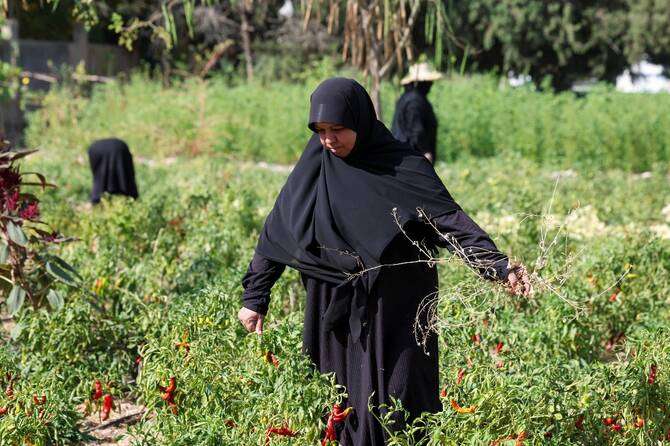Women in south Lebanon say war never ended

Almost a year after a truce was signed between Israel and the Lebanese armed group Hezbollah, women living in the villages of southern Lebanon say the conflict is far from over, Arab News via AFP and Reuters reported on October 22.
Despite the absence of rocket fire from Lebanon, Israeli strikes continue and defacto occupation of hillside positions is preventing civilians from returning home, say residents, Lebanese officials and human-rights organisations.
The cease-fire, mediated by the United States and brokered on 26 November 2024, was intended to enable civilians on both sides of the border to return safely to their lands and homes.
Yet tens of thousands of people remain displaced in the hilly villages of southern Lebanon, unable or unwilling to go back amidst flattened houses and continuous Israeli military incursions.
One of those still displaced is 50-year-old farmer Zeinab Mehdi, who fled her home in the border town of Naqoura when the fighting escalated last year. She now works on a small farming project in Tyre supported by the United Nations Women’s agency.
“Whatever house was still standing or land was still in good shape, they razed,” said Zeinab Mehdi. “They pulled water pumps out from the ground and destroyed them. All the irrigation I had in the ground is broken. I have nothing.”
Her story is echoed across the region. Though major shelling has ceased, Israeli forces are reported to remain on hilltops across southern Lebanon, flattening homes and maintaining positions that effectively restrict civilian return.
While official statements declare that rockets are no longer being launched from Lebanese territory, local rights groups and residents say the reality is one of constant tension.
Israeli officials defend their ongoing strikes as necessary to counter Hezbollah’s efforts to re-establish military posts and train new fighters. Conversely, Hezbollah denies any attempt to rebuild militarily in the south and accuses Israel of deliberately keeping civilians out of their homes.
Some analysts describe the situation in southern Lebanon as ‘the new normal’ for the region: a period of recurring strikes, ongoing occupation and no full-scale war but no genuine peace either. This form of ‘frozen conflict’ carries serious implications for border stability, humanitarian conditions and prospects for reconciliation.
The border zone, already battered by years of conflict, now bears the scars of both immediate fighting and longer-term disruption. Infrastructure such as irrigation systems has been damaged or destroyed. Farmers like Mehdi face not only lost homes but lost livelihoods. In a region where agriculture is a mainstay and for many women the only route to independent income the continuing instability is particularly acute.
Humanitarian agencies warn that the combination of destroyed infrastructure, ongoing military presence and uncertainty about the future is suppressing returns. Many displaced families are staying in makeshift shelters or with relatives, unable to rebuild when bombs might still fall or landmines may still lie buried. The truce does not currently guarantee normal daily life.
Observers note that southern Lebanon’s condition may offer a preview of other frontline areas, notably the Gaza Strip, where a fragile cease-fire is in place. The pattern of periodic strikes, ongoing military occupation and blocked returns raises concerns that similar outcomes may arise elsewhere.
On the ground, the women of south Lebanon are raising their voices: they say the war may have paused, but the damage endures, and the path to recovery remains blocked.
For those calling for a broader reconstruction and return programme, the key challenge remains access, both of civilians to their land and of relief agencies to trapped regions.
Arab News and Reuters, Maghrebi.org
Want to chase the pulse of North Africa?
Subscribe to receive our FREE weekly PDF magazine














